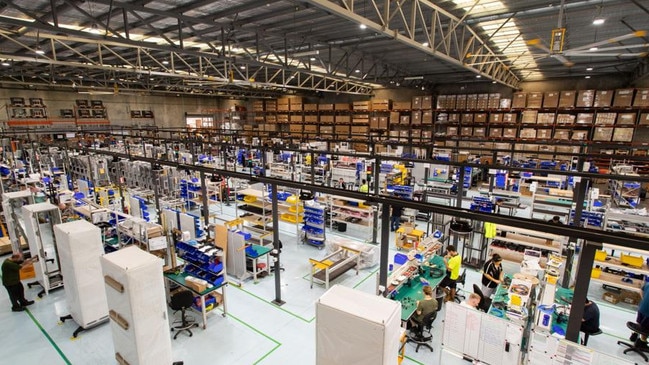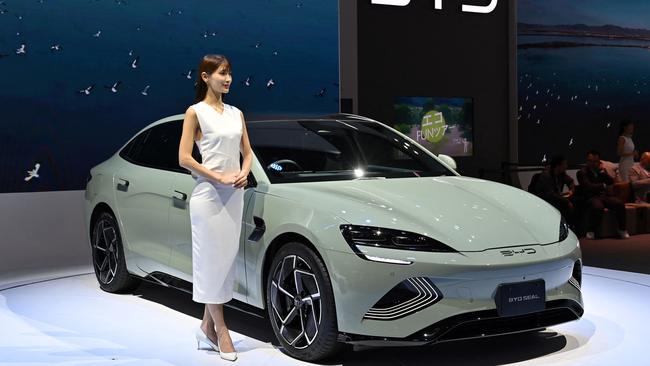Struggling with hype, the electric car sector gets a jolt of reality
Electric vehicle proponents would have us believe it’s all over for the internal combustion engine but while EV sales power ahead, the industry’s ride is far from smooth.

Business
Don't miss out on the headlines from Business. Followed categories will be added to My News.
This time last year it looked like the shift to electric cars was moving into overdrive: multiple billion-dollar deals were being signed off from the major car companies, share prices were running hot and the first federal EV tax incentive had been announced by the Albanese government.
One year later, investors have had a jolt of reality. The heat is rapidly coming out of the EV investment sector, projects are being canned and even jobs are in jeopardy in the domestic auto industry.
What’s more, the auto industry, which appeared to be in a race over which incumbent brand would lead the switch to EVs, has split, with old-world champion Toyota openly clashing with new-world titan Tesla on whether EVs are actually suitable for Australia’s unique conditions.
Investors are watching carefully: Australia’s most popular overseas stock, Tesla, has just reported disappointing quarterly numbers that included a bout of price discounting – a move that would have been regarded most unlikely 12 months ago.
The nearest thing we have to an EV benchmark on the ASX is the Global X Battery tech and lithium fund, better-known as the ACDC ETF – it’s down 7 per cent over the last year, while the broader ASX 200 is flat.

And then there is the spectacular story of Tritium, the Australian Nasdaq-listed EV charging company employing 400 people in Brisbane. The stock has been smashed to the point that the company is asking for government handouts. Tritium shares have dropped from $US10 to just US19c this week.
Tritium is an EV-charging company that makes both hardware and software for the EV sector. In the days ahead, it is most likely to be privatised and the bulk of operations moved to the US. More importantly, it’s going to emerge as a standout failure for the local EV sector.
The Tritium drama must be seen against the global backdrop. EV sales are moving strongly, the changeover from petrol and diesel is happening – but it is not happening as fast as many expected.
Earlier this week one of the big ticket deals that signified that boom in 2022 fell apart – General Motors and Honda, which had a $US5bn plan to co-develop cheap EVs, announced they would not go ahead. GM chief executive Mary Barra said: “We’re taking immediate steps in our EV portfolio to adjust to slowing near-term growth.”
What happened? Put simply, market fundamentals changed. Rising interest rates meant that growth stocks – especially listed companies built largely on the promise of future earnings – are utterly out of fashion.
The other significant change is the rise of China as a potential EV powerhouse.
Tax tailwinds
As investors face what they hope is an air pocket in the longer-term growth story of the listed EV sector, on the ground the picture is considerably healthier.
In fact, the EV trade has been enjoying unexpected tailwinds due to a double tax benefit. The first and most important is unofficial – they do not have road usage taxes. The rejection by the High Court of Victoria’s attempt to launch a road usage tax on EVs last month means that the states will keep away from trying anything like that again.
There is, of course, plenty of pressure from other sectors to create a universal road user tax – and it will happen eventually, but it is not going to arrive any time soon.
The second is official: the federal novated leasing tax exemption announced last year means if you lease an EV it is fully tax deductible, while if you lease a petrol car it is only partially deductible.
As EV buyers play to this advantage, there were more EVs sold in the first half this year than in all of 2022 – 46,624 versus 39,353. The sector is also broadening immensely – a year ago there were only Teslas and a handful of brands on the menu. In fact, major carmakers claimed they would not export popular overseas brands to our market because the infrastructure was insufficient. Today there are an estimated 50 different EVs to choose from.
The arrival of low-cost China-made EVs may have an impact like Japanese fuel-efficient cars had a generation ago – a step change for the local auto sector. EVs are still not competing with the HiLux outside the cities. But they are now competing strongly with mid-priced urban sedans.
A fortnight ago when China-based BYD launched its mid-priced SEAL model, the Australian website of distributor EV Direct crashed due to the spike in traffic. EV Direct reported there were 50,000 visitors to the site in the 24 hours after the BYD launch. The SEAL is set to become a head-on rival to Tesla’s Model 3.
In between these new-era car giants are the traditional leaders such as Toyota, which now risks being left behind in EVs.
Toyota has held back on supporting incentives for battery EVs. Last month Sean Hanley, VP of sales and marketing at Toyota Australia, went as far as trotting out the old trope suggesting EV’s were powered “in many cases by electricity generated from coal”.
Which is true, but less true with each passing year. Notwithstanding the debates around energy security, about a third of grid power is now from renewables.
Two EV sector kingpins that would know perfectly well about the balance between coal and renewables are Trevor St Baker and Brian Flannery, two key shareholders in Tritium. The pair bought the Vales Point coal station from the NSW government for the princely sum of $1m – it was later revalued at $722m before the pair sold their interest in the coal plant to a European concern.
Today they have multiple interest across the energy sector – and are now watching to see if the government will help their case again as Tritium is seeking $90m.
But perhaps once bitten, twice shy. Industry Minister Ed Husic all but ruled out government support earlier this week.
Originally published as Struggling with hype, the electric car sector gets a jolt of reality



